Moving to Israel for work is an excellent opportunity to give yourself and your family a chance to start a new life in one of the most developed countries. A country with a high standard of living, a stable economy, a pleasant climate and good employment conditions attracts foreigners from all over the world. In addition, after some time of constant living and legal work in the Holy Land, you can apply for permanent residence and citizenship. This opens up additional prospects and makes it possible to enjoy all the benefits that the residents of Israel have.
But the desire to leave is not enough: you need to carefully prepare, choose a city for a new place of residence, study the labor market in this region and insure yourself in case of any risks.
Are we needed in Israel?
In recent years, the Israeli economy has grown at around 3% annually, but in 2021, due to the impact of the coronavirus, a decline of 6-7% is predicted.
However, the upward trend is expected to resume in 2021. Israel cannot boast of either vast territory or natural resources. The main wealth of the country is its people. A rapidly growing economy needs both qualified specialists and ordinary workers.
The unemployment rate was a record low for the country back in February 2020: 3.42%, but in June, after business shutdowns caused by the pandemic, it was 4.5%. For comparison, in the European Union even before the start of quarantine, at the beginning of 2021, the average unemployment rate was 7.4%.
In such a situation, it is natural that the country focuses not only on its own resources, but also on the influx of labor from abroad. The conditions offered are attractive.
Highly qualified specialists are most in demand in Israel. For example, doctors can earn up to $10,000 a month, and good programmers on average earn $4000-5000. But to get such a job, you need to meet a number of requirements, which we will talk about later.
However, workers who do not have special knowledge are also constantly needed here. For example, it is quite possible to get a job as a harvester for the season, an auxiliary worker, a nurse, or a service worker.
People
You could write an entire dissertation about the people in Israel, and it’s definitely impossible to fit everything into a couple of paragraphs. Remember at the very beginning I mentioned the material about Kotlas? Can you imagine the average resident of such a city? There are a lot of them here among the Russian-speaking population. After all, I repeat, to immigrate to Israel, you don’t have to be a genius.
There are also people here who came after the collapse of the USSR, in the 90s, who then had to eat a ton of salt. Now they have somehow made their way, someone was even able to buy an apartment with a mortgage, which they are still paying off, and these people sincerely believe that you should eat the same peck (you can replace the salt with a less pleasant substance). They consider Israel the best country in the world, and as soon as you mention something wrong, you are recognized as an enemy of the people, and shouts of “Don’t like it? Get out!”
However, there are quite adequate and educated people, both old-timers and newcomers.
How to find a job?
The fastest and most effective method is the Internet.
English-language resources
- Israemploy;
- CareerJet;
- GigaJob;
- Indeed;
- Learn4Good (education opportunities, internships, etc.).
Portals in Hebrew
- Jobnet;
- AllJobs;
- Job In Israel;
- HotJobs.
Websites in Russian
- Orbita;
- Rabota.co.il;
- Israel;
- Jooble;
- IsraelInfo;
- Work in Israel;
- Il4ru.com
- Israeljob.net
- Rabotaisrael.com
- Rabota-israel.ru
Additional sources
In addition to aggregators and job sites, you can:
- Directly send your resume to companies of interest. The list of leading organizations in the country is here.
- Search for vacancies in specialized groups on social networks. For example, here: Facebook, VKontakte.
- Contact your relatives and friends who live here. By the way, most locals find work this way.
Special programs for employment in Israel
The country has government programs to help immigrants find work. In particular, job offers as caregivers are aimed primarily at women or married couples. Among the advantages are the opportunity to get a job even without knowing the language, official employment with vacation and health insurance. However, it is necessary to take into account that you will have to work with elderly, limited mobility, and incapacitated people. Often the work involves not only caring for the ward, but also cleaning and other help around the house. You will live in the same house as your ward, although there are options for working in hospices and medical institutions. In return, the host party bears the costs of food and accommodation.
A special feature of the program is a one-time contribution of about $1000. The contract is signed for 1 year, the period can be extended to 8 years.
Availability of immigration
The influx of tourists from different parts of the planet is mainly based on the abolition of visa entry into the territory of the historical land.
Within 90 days, you have the opportunity to see all the sights, penetrate the local mentality and culture. The issue of immigration and obtaining citizenship is now resolved faster and easier than before.
First way
It is officially stated that migration policy is based on the return of indigenous residents and foreigners with Jewish roots to their homeland. Therefore, an accessible way to emigrate to Israel is to restore citizenship based on confirmation of belonging to Jewish culture.
This point is legally stipulated in the draft on repatriation.
Also in this country, the “Right of Blood” is valued, which applies to the entire family up to the 3rd generation. Therefore, for a quick and reasonable move, you will need to collect documents to confirm your family relationship.
Second way
Obtaining a visa for work, which will give you the opportunity to find a job there. The method is known among Russians due to the fact that they highly value experienced, knowledgeable and skillful specialists. In this case, the government or company will handle the paperwork.
Studying children on a student visa often leads to their further employment and, of course, obtaining citizenship in the future.
Third way
Marriage. A rather complex process, which includes: obtaining a residence permit, subsequently permanent residence and citizenship.
Problems of illegal migration are common in all countries. In this case, if official registration is refused, the emigrant must leave the country within seven days. Otherwise, an arrest warrant is issued and the offender is transferred to a deportation prison.
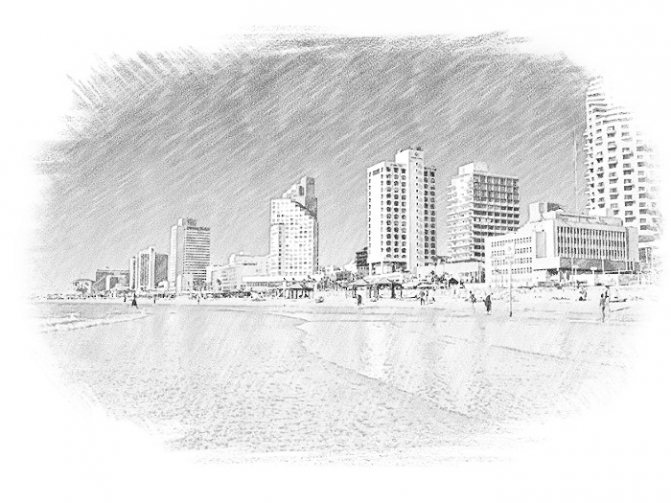
How to choose a city to work in?
The best chances of finding a place are in the country's major cities: Jerusalem, Tel Aviv, Haifa, Ashdod. Depending on the city, it is worth focusing on certain areas of activity.
For example, Tel Aviv is the business “heart” of the country: the economic, financial and cultural center of Israel. Both production and scientific and technological companies are located here, in terms of the number of which Israel occupies key positions in the world. Accordingly, engineers, programmers, and financiers are in demand here. And, of course, production workers. Moreover, Tel Aviv is a city where Israelis love to have fun. It's no surprise that a quarter of Tel Avivians work in the service sector.
Haifa has a reputation as a scientific and university leader. Those who plan to study or teach, as well as work in the scientific or technological field are drawn here.
Jerusalem is a cultural and religious center of world significance. It is difficult to imagine tourists who will not visit it during a trip to Israel. For this reason, the service sector here is well developed and always welcomes workers who speak different languages.
Tel Aviv, Haifa and Jerusalem have the largest world-famous medical centers. Doctors, nurses, and other medical personnel will find a place to work here.
Ashdod is the largest port in the country, where technical specialists are always required: both with special knowledge (engineers, mechanics, navigators) and without them (equipment operators, loaders, auxiliary workers). There is a large paper mill here that accepts foreign citizens who do not speak Hebrew.
Accommodation and prices
Each repatriate—as newly minted citizens are called in Israel—is entitled to an absorption package. This is a monthly allowance paid within six months from the date of arrival. For a family of three people it is 6,000 shekels (approximately 102 thousand rubles).
Is it a lot or a little? Firstly, you need to try very hard to find a two-room apartment in Tel Aviv for less than 4,000 shekels (68 thousand rubles). And for this money you will get an apartment somewhere on the outskirts, in an old panel house reminiscent of our Khrushchev buildings.
Secondly, you still need to convince the owner to rent this apartment to you - after all, you are unemployed, and it is unknown what will happen to you in six months, when your benefits end.
Thirdly, in addition to rent, you also need to pay for utilities, where the most expensive item is electricity. So, in July alone - the hottest month, when the temperature does not drop below 30 degrees even at night, and the air conditioning in the house works almost around the clock - the electricity bill amounted to about 600 shekels (10 thousand rubles).
In addition to the cost of an apartment, which can eat up almost the entire allowance, you also need to pay for mobile communications, internet, and travel (one bus trip costs 100 rubles).
Oh yes, you still need to eat something. Food prices are also higher than in Moscow: a kilogram of chicken breasts is 500 rubles, a kilogram of rice is 200 rubles, 1 regular yogurt is 80 rubles. Breakfast for two in a cafe - scrambled eggs and salad - 1,700 rubles.
Requirements for foreigners
Language knowledge
Ideally, you need to know Hebrew: most jobs require a good command of the official language of Israel. If you do not have such knowledge, there are three options left: finding a place with a Russian-speaking employer, in an international company where you can get by in English, or taking intensive language courses.
In the first and second cases, your opportunities are limited to work that does not involve communication with locals. In the third case, you will need to spend 3-5 months on training.
Confirmation of qualifications
For some professions (doctor, lawyer, engineer, etc.) you will need to confirm your diploma and also receive a special certificate, which is issued only if you have permanent residence in Israel. By the way, doctors’ salaries here vary greatly depending on their status. For example, a junior doctor can do residency for five years, pass exams and earn 2.5-3 times more. And extensive experience and work experience in public clinics allow you to earn about $10,000.
More information about the required list of documents and the action plan if you want to confirm your diploma is here.
When looking for a job, you will have to take into account the local temperament: the country values hardworking employees. Yes, to find a suitable place, you will have to write to more than one company and send out dozens of resumes, but in return for quality work you will be treated well and promoted in every possible way up the career ladder.
In Israel you don’t have to be shy to express yourself and be persistent. If you have professional qualities and achievements that you are not ashamed to demonstrate, your straightforwardness will be appreciated here. Do not hesitate to ask again, call back, persistently achieve your goal - this is a normal approach in the country.
Disadvantages of moving to Israel after 1.5 years of life
I’ve already written about the pros, but now let’s look at the cons. There are no fewer of them. I tried to remember everything that I had to face in 1.5 years, and that was unusual and difficult for a person who came from Moscow and from good conditions. Things to know and keep in mind before deciding to move.
I want to say right away that I am for realism - what I see is what I write about. If there is garbage, it means it exists, and does not mean that I invent it and specifically focus on it. And if I don’t see him in another country, then I don’t see him in another country. It's simple. We are all different and perceive everything differently too. So “let’s not talk about the bad”, this is not about me, we need to call things by their proper names. In any case, this post is just my subjective view of what I saw. Another person with different initial data may have a completely different perception of the same reality. I ask Israeli patriots not to be offended.
War
Many pros and cons pale before the word “war”. She has been going for many years. The Arab-Israeli conflict is many years old, and there is still no solution (and there is unlikely to ever be one). But Israeli patriots will begin to say that all this is bullshit, that shells rarely fall, that many houses have bomb shelters, that Israel has the best air defense system (dome).
Of course, while I lived in Haifa, not a single shell fell near the house. But you know, when I read the news that a helicopter was shot down in the vicinity of Haifa, that a bomb was found in a children’s playground 100 km away (if it hadn’t been found, it would have destroyed the entire neighborhood), I felt uneasy.
The news about the dome is also not so encouraging. He may be the coolest, but the enemy’s technology does not stand still. And if earlier missiles could barely fly over the border, now they will easily fly over the whole of Israel and land, be it in Haifa or Tel Aviv. And according to reports, the dome does not shoot down 100% of missiles, or even 90%. It’s just lucky that they don’t fall in cities, but nearby.
Old housing stock
The housing stock is just terrible. The houses are old, cold in winter, there is no central heating, the entrances are often open and ventilated, most houses do not have an elevator. And the furniture in budget rental apartments... I understand perfectly why many people here prefer to rent without furniture and buy/bring their own. Apartment renovations are usually very simple in the form of painted walls, no double glazing, icy tiled floors. Such neglect of thermal insulation is excusable for tropical countries with eternal summer, but why here, where in winter the temperature can drop to zero, I don’t know such housing.
In general, locals, as I understand it, have a much simpler attitude towards housing than Russians. I remember the realtor convinced me that it was normal to sleep in a hat and jacket, because there was simply a strong wind today and it was blowing “a little” from the cracks in the walls. Of course, I understand everything, I can even understand the electric heated sheet that many people have here, but sleeping in a sheepskin coat and having cracks in the walls is too much.
There are completely new houses, or relatively new, but good-quality ones. However, there are few of them in the total mass and rental prices are higher. There is a shortage of good apartments (due to a combination of factors). That is, among budget apartments you can find something worthwhile, but you need to stock up on time and luck. Or immediately be ready to pay more.
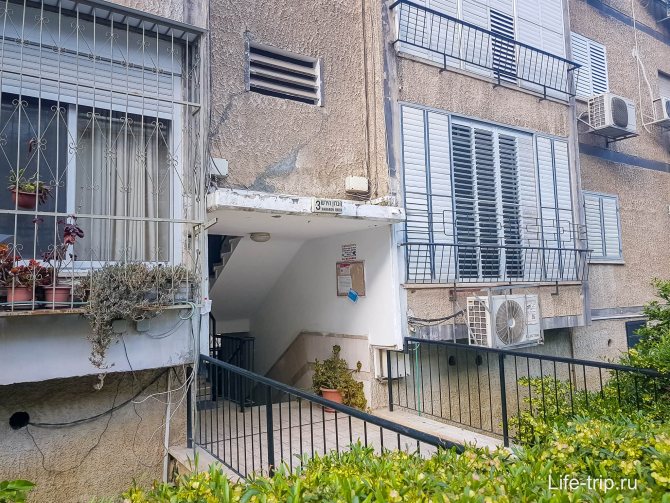
Old housing stock, somewhat reminiscent of Khrushchev buildings
The windows are a song. Double-glazed windows are very rare. Typically all windows are sliding single glass. If the house is new, then there is a kind of seal along the edge of the frame and then there is not much blowing from the windows (but it still blows). In old houses, there is actually siphonitis coming from the windows. Well, the frames themselves are all metal, that is, they allow heat/cold to pass through perfectly. I think it is obvious that if there are cracks in the apartment, then it is useless to heat or cool it, it will immediately let everything out.
How do you like windows that basically don’t close? I've only seen these in Asia, where it's 30 degrees all year round. Glass blinds that you can only cover. In essence, it turns out to be a lattice instead of a window. People seal them with tape and cardboard for the winter.
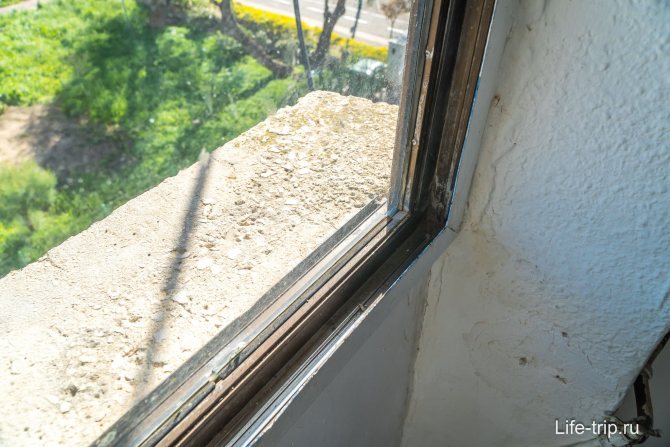
Sliding metal window frames with slots

Louvered windows that I have only seen in Thailand
It's hard to figure something out
It is impossible to fully understand something. You ask people, read forums, but all the time one piece of advice contradicts another, and it seems that everything depends on the specific situation. For example, it comes to the point that you can even bargain with a bank. For me this is nonsense. If there is a law/tariff in Russia, then it exists, and it is always the same for everyone. And here, under a certain set of circumstances, they can, for example, give you a discount for the Internet, or give you a credit card, although they don’t give it to anyone. Only because you left, saying that the conditions did not suit you, or caused a scandal. And so in everything, there is no accuracy or specificity. And it seems no one is trying to fully understand it; everyone has their own experience in the same situations.
I need to tell you separately how I bought the SIM card. It seems like I was well read, I spent the whole day studying the forum, then I talked to local people, but... I came to a store where they sell mobile phones, and they convinced me that without a credit card no one would sell me a SIM card for locals, that you can only buy an expensive one for tourists. Nevertheless, I go further to the Hot Mobile operator counter and there they tell me that they will sell a SIM card without any problems, they only need my account number in an Israeli bank and it makes no difference at all whether I issue a SIM card for a credit card or an account number. I return to the mobile phone store and tell them. There they convince me that this cannot be, but they are already backing down and saying that you can buy, but there will be a separate large commission for not having a credit card. I go again to the Hot Mobile counter, they say there is no commission. Then I come to the Hot Mobile counter with a salesperson from the salon so that they can explain in Hebrew what is really there.
In the end, it turns out that without a credit card they will sell without any problems, but there is a commission, but very small, and this commission is always there, regardless of whether it is a credit card or an account. An hour of time was spent on solving such a trivial issue as buying a SIM card and searching for the truth. The competence of the staff is terrible.
By the way, the salesman in the mobile phone store was very convincing, firmly convinced that he was right. In general, my conclusion is, when asking something, don't trust anyone 100% and double check 

Banking sector
Opening a bank account takes about an hour. At the same time, I signed my name 20 times. Twenty, Karl! They didn’t give me a credit card right away, because I need constant receipts into my account. But okay, in Russia, too, without a credit history, not every bank will issue them. Only with debit cards there is a commission for each transaction! Withdrew money from an ATM - a commission, paid in a store - a commission, made an operation in an information bank - a commission. There is no interest on deposits, no cashbacks. Checkbooks are still in use. Payment for services such as the Internet is tightly tied to a bank account, so that after canceling the service, they can safely continue to write it off (and not from the internal balance in the provider’s personal account).
After a while, I was given a credit card from the Shufersal supermarket, which belongs to the Cal company, which is not exactly a bank, but who knows what. I waited a month for it to arrive in the mail. It made life much easier, since not all stores accept foreign cards. And here they still swipe cards with a magnetic stripe! No one has heard of PayPass, and even more so Samsung/Apple Pay.
Guys, Russia has a cool banking system! I have Russian cards with free annual service, good cashback, travel insurance, online chat with employees. Only now inflation in the Russian Federation and the regulator are trying to nullify this advantage.
Separately about money and shopping. Imagine, you are a new repatriate, you move into an empty apartment, and you urgently need a refrigerator. Let's say it costs 3,000 shekels. When you go to the store to pay in cash, they tell you that delivery will be in a week. For a long time.
Okay, there is an option to buy on the store’s website, there are models with delivery in 1-2 days. But the site does not accept any cards other than local ones. You don’t have a credit card yet, but on a local debit card, if you already have one, the limit is 500 shekels. And then, either wait a week, or go to the bank to change the limit (if this is possible, I haven’t checked). Or ask friends to pay and then give it to them in cash. There are a lot of such difficulties, although not critical, at first, so be prepared.
Garbage, dirt and architecture
There is a lot of dirt in general, which came as a surprise to me upon arrival. True, I didn’t expect how dirty it would be for a country that positions itself as European. Not Thailand, not Vietnam.
Garbage under trees near the road and in the grass, bulls on lawns, garbage near trash cans and trash cans, and often the streets themselves are dirty, especially not in prestigious areas. It's not uncommon to see dog shit on sidewalks. There is also a lot of trash on the beaches. I won’t speak for Russia for everything, but Moscow is simply an ideal of cleanliness compared to Israel.
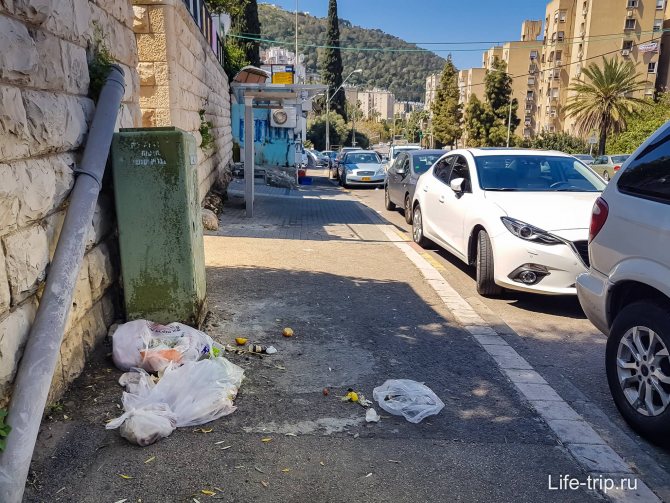
Garbage on the street in Haifa, Kiryat Eliezer district
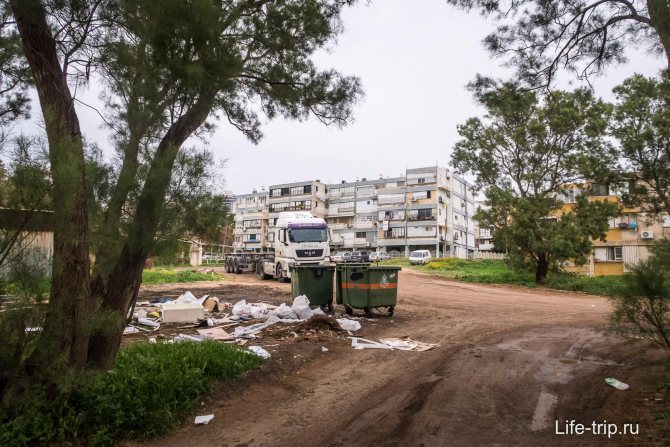
Garbage on the street in the Neve David area
Also, the visual component here is not for everyone when we talk about urban architecture. For me, there is no architecture, these are some shabby barracks, with peeling paint, with protruding wires, etc. Yes, residential areas in Moscow are also not an example of aesthetics, but not to the same extent. Israel gravitates more towards Asia in appearance, so don’t expect a toy Europe with red roofs.
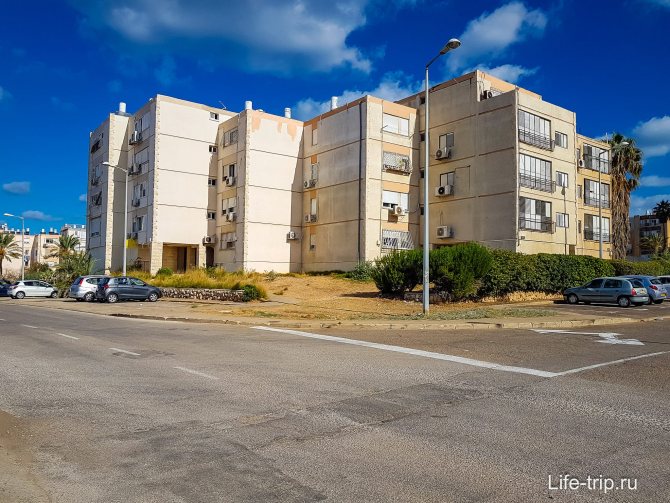
A typical example of Israeli architecture
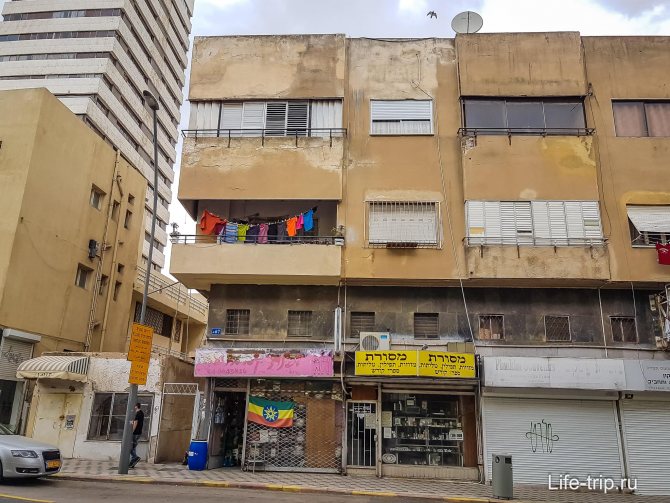
In the Adar area there are some scary barracks
Very expensive
I just went to the supermarket to buy groceries for a couple of days and oops 300-400 shekels (7,056 - 9,408 rubles), although I only bought a couple of bags of food. Of course, if you stock up in bulk, know all the prices and buy cheese in one supermarket, milk in a second, and chicken in a third, go to the market and bargain there until you’re blue in the face, then you can reduce costs somewhat.
However, in Moscow I’m used to buying in supermarkets like Pyaterochka, almost without looking at the prices. Considering that I buy the most ordinary products, and not some 20-year-old cognac. You can't relax like that here.
For example, the price of tampons is 32 shekels (753 rubles), I think women know how much they cost in Russia.
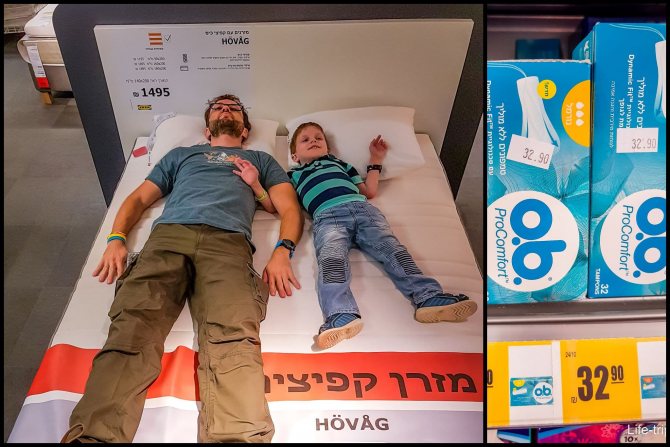
Tampons 32 shekels, mattress 1495 shekels
Or take Ikea. In theory, this is a budget furniture store, but for the budget HOVOG mattress I had to pay 1,495 shekels (35,164 rubles). The exact same one in Russia costs 9,000 rubles. We also bought other goods at Ikea, the price difference is about the same.
All equipment also costs 1.5-2 times more. At least don’t look at the prices at all, what they were in Russia. I can only join the advice from the forum that when repatriating, you need to bring all the equipment from Russia. And it’s time to update your laptop, camera, phone, etc. before moving. In principle, if you then visit Russia at least once every couple of years, then it makes sense to buy all the gadgets on these trips.
All prices for cars in Russia must be multiplied by 2 to estimate how much a car costs in Israel. Apparently this is why there are a lot of small cars and economy class cars in general. All my friends in Moscow have cars that, in principle, ordinary office workers can buy for themselves, here apparently move to a different class. Below you can see in the screenshot the price of the new Kia Rio: 113,900 shekels or (RUB 2,679,051).
It’s just a budget car, but it costs a decent amount. I doubt that even this is available to the vast majority of those who have moved. For example, I ended up buying a used Hyundai i30sw 2014 with 70 thousand mileage for 65,000 shekels (1,528,870 rubles), which I later gave to my ex-wife. Yes, damn it, for this money in Russia you could buy 2 similar cars.

The new Kia Rio 1.4 sedan with automatic costs 113,900 shekels
Many of the cars here are shabby in appearance, especially the bumpers. For those who are used to the fact that the car is all sparkling and shiny, this will be a real minus, but I have a simpler attitude towards hardware. In Israel they don’t really worry about every scratch; they can drive out of a parking lot, hitting someone, but they can, of course, cause a row.
Slow Internet connection
Judging by the stories of locals, as well as our own experience, the speed of mobile Internet leaves much to be desired. 15 megabits is already good for mobile Internet. I myself now have Hot Mobile and it hasn’t shown more than 30 megabits in Haifa yet, but most often it gives about 2-5 megabits (even though 4G is working). But if we talk about incoming traffic, outgoing traffic is never more than 2-5 megabits, only lower.
Home wired Internet is also not far off, the speed, if you're lucky, is 70 megabits/s for incoming calls (usually 30-40). And the outgoing channel is 2-3 megabits/s. That is, asymmetric channels are still used here. By modern standards, the Internet is very behind. Why in Israel, which is like a high-tech country, there is such an Internet is a mystery to me.
And while it might work for mobile Internet, it won’t work for home Internet. This speed for the outgoing channel means goodbye clouds! In Moscow I have 100 megabit/s in both directions and it costs a penny, but the speed never drops. Yes, yes, here in Israel the speed also periodically drops, down to zero. In Spain I have a 300 megabit/s optical channel.
IMHO, the Internet situation in Israel is about the same as in Thailand several years ago. And I’m generally silent about Russia, it’s just a cosmic Internet. Yes, they say there is one provider that uses other technologies and symmetrical channels, but it has very little coverage throughout the country. It seems that it is only available in Tel Aviv and not everywhere.

Internet speed at my home, although the tariff is 100 mbps
Internet services
Internet services and websites in Israel are at the level of Moscow 10 years ago. You know, I’m used to ordering online, so you place an order and the next day the goods are delivered to me. I’m used to the fact that many online stores have pick-up points near your home. I’m used to the fact that for any product there are a bunch of different sites with reviews and there are forums where specific models are discussed. I’m used to the fact that there is always a choice of services. I’m used to the fact that services and sites are of very high quality, modern, intuitive, and not html made on the knee. Interface usability is everything!
An analogue of the Russian Avito is yad2. Sellers on Avito in Russia are simply an example of eloquence and photographic skill. Here in Israel, many advertisements have very scant descriptions (if any at all) and in most cases do not have photographs. And if there are photos, they look as if they were taken with a vacuum cleaner.
Perhaps it’s not customary to take photos and descriptions, I don’t know. As a result, you can’t understand absolutely anything from the ad, which means you can’t filter in advance whether this apartment, sofa, car is worth looking at or not. You have to go see it live. As a result, searching for a used one is still a time-consuming quest. At the same time, the owners are very upset that after viewing the product you do not take it. Well, it's an ash stump, I haven't seen any photos before, and this greasy sofa didn't appeal to me at any price. And they even sell things here that would be a shame to throw away in Moscow.

One of the most modern sites, an analogue of Yandex.Market
PR
PR, if you can call it that, exists in many countries, and Israel is no exception. There is such an attitude that everything is fine with us, but if you notice something bad, then they will throw tomatoes at you and generally suitcase-station, get out of here. There is a concentration of attention purely on the positive aspects and deliberate ignoring of the negative. I am a supporter of healthy realism, as I wrote above. We need to know and talk about problems.
I noticed that, consciously or unconsciously, people here highlight even little things, like, look, we have this and this. Although in fact it is already everywhere and has become something common. I immediately remember how a long time ago I was visiting friends in France and they showed me a supermarket, saying, look what stores we have. Great, of course, but in Russia there had been supermarkets for a long time by that time, so it’s no longer a plus that there are supermarkets in France. Although, of course, having a supermarket is definitely a plus.
So, I have a feeling that some repatriates who left Russia in the 90s still think that it’s the same there, but Russia has changed a lot, and the whole world has changed too. Therefore, when they say that Israel has excellent Internet, then... It exists, it’s kind of a plus that it exists at all (after all, it could not exist), but it is far from the Internet, for example, in Russia.
Thus, behind PR and some fictitious superiority, there are minuses and pluses, which may not be pluses at all, but commonplace in the modern world. As a result, overly gullible repatriates who still believe in some ideal country may be disappointed upon arrival.
Shabbat and opening hours
From a consumer point of view it is very inconvenient. On Shabbat, which lasts from Friday to Saturday, everything comes to a standstill. There is nothing wrong with two days off, it’s like this everywhere, but nothing works, not shops, not banks, not part of public transport. That is, if you want to do some things on the weekend, then forget it, they can only be done on weekdays. It will be difficult for a person who is accustomed to 24-hour stores in Russia, to the fact that a lot of things are open seven days a week (at least private organizations, not government agencies).
Separately, it is worth mentioning the operating time. For example, banks work not only on weekends, but also only 5 hours a day (from 8 a.m. to 1 p.m.). Sometimes there are a couple more evening hours, but in Russia even the conservative Sberbank works from 8 am to 7 pm and sometimes without days off at all. Authorities and clinics in Israel work in a similar way, only part of the day.
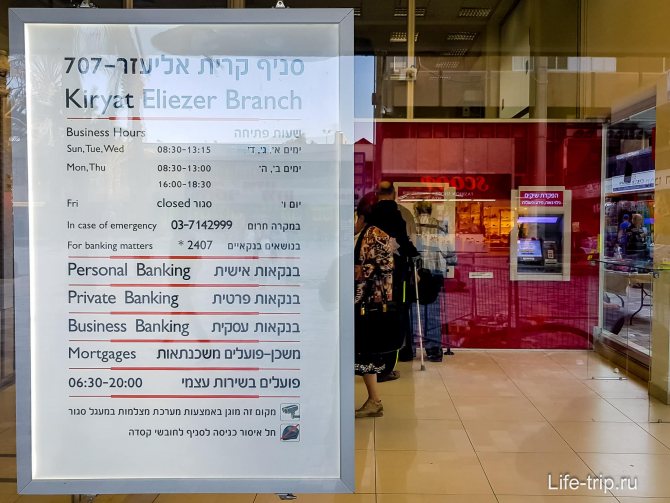
Bank Hapoalim opening hours
You can say how great it is that labor law is respected and people don’t get caught up in work. But this does not apply to new repatriates; most of them work hard from morning to night in order to somehow survive. They have no advantages at all from a short working day, they will just have to take time off from work once again to do some things.
Religion
They try to present Israel as a secular state, but in fact it is not. Maybe for a tourist, but not so much for a living person. One way or another, religion permeates all of Israel and you will encounter aspects of it quite often.
If you are not religious, it will be difficult for you to get a job; you are unlikely to get a good place. Not everyone will understand if you work on Shabbat. At school, your children will be told a lot of things on religious topics, they will be “forced” to celebrate religious holidays and know their history. You may have to eat kosher food to pass as one.
Orthodoxy is a separate issue; I know little about them. Besides the fact that they do not work and live on benefits from the taxes that you will pay to the state. And sometimes they smell bad.
Hebrew cannot be read
Despite the fact that I wrote in the pros that there are Russian-speaking employees in certain organizations here, it will not be possible to ignore Hebrew. And, above all, the problem arises with reading the text. Because in other countries where the Latin alphabet is used in the language, even if it is incorrect, you will be able to read something. More precisely, at least you can distinguish one word from another, and even remember that this jar says “sour cream”, and this one says “yogurt”. Moreover, this will happen without much effort.
The letters of the Hebrew alphabet merge into a single unreadable script, completely indistinguishable at first. Therefore, whether you want it or not, you will have to learn Hebrew at a minimum level. For me, it’s still a problem to buy sour cream, because in the store, in a huge 3-meter refrigerator, all the cans have exactly the same-looking squiggles painted on them, but in fact there’s a whole range of dairy products.

Everything blends together and is not readable for those who have not studied Hebrew.
Separately, it must be said that until you speak Hebrew perfectly, you cannot apply for a normal job. You will be a stranger and your limit will be cleaning apartments or being a salesperson in a store.
Accessibility and parking
I will only say about Haifa. Most of the city is located on the mountain and on its slope, so the accessible environment for the disabled is only at the bottom. Actually, it was downstairs that I constantly saw wheelchair users. It’s difficult at the top, there are a lot of stairs. And in general, I can say that not everything has been thought out and not everywhere. That is, if, again, the repatriate wants to see some kind of paradise for strollers, then it is not here. I think the situation is better in Tel Aviv, but it’s also not ideal.
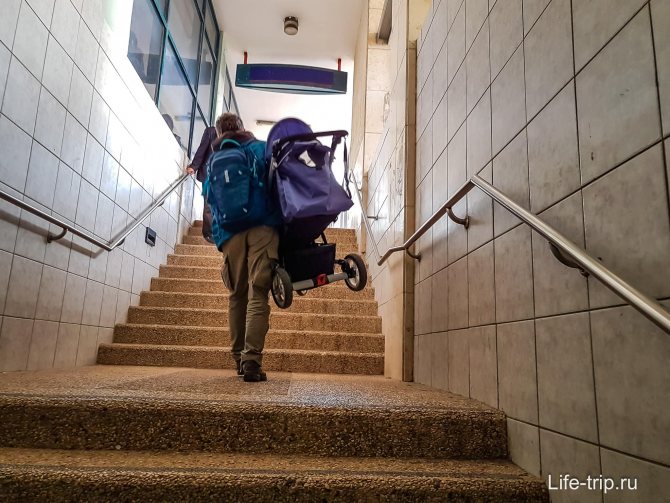
In Haifa you sometimes have to carry a stroller
I would also like to make a special mention of parking – this is the scourge of Haifa. There are incredibly few parking spaces; cars are often parked on sidewalks and pedestrian crossings, so it’s impossible to get through with a stroller. The mayor does not want to resolve these issues at all, but only fines careless drivers.
Some of the parking lots are on the ground, and it’s good if there is at least crushed stone there. But sometimes it’s just dirt, so after the rain everyone stands in puddles.
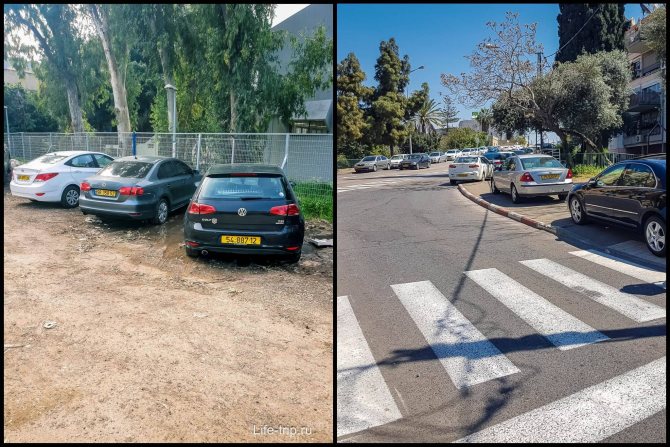
Parking in Haifa
Khamsin and climate
Khamsin is a hot wind that comes from the desert and brings sand with it. On the one hand, it’s cool to get 25 degrees instead of 10 for a couple of days in winter, but in summer it’s 40 degrees and dusty air. It becomes difficult to breathe in the apartment, sand dust is everywhere.
The environment in Israel is generally not very good, and the worst is in Haifa due to the large port and ammonia storage facility. And khamsin also adds its contribution. I’m not sure that allergy sufferers should go to Israel, as well as those prone to bronchopulmonary diseases. I also know more than one person who started having problems with their skin and hair.
And although I mentioned the positive climate, we must remember that those who cannot tolerate the heat will not have a good time here either. In August it can be 40 degrees, the air is stagnant, plus khamsin, it can be very difficult. Only air conditioning in the apartment and car will save you.
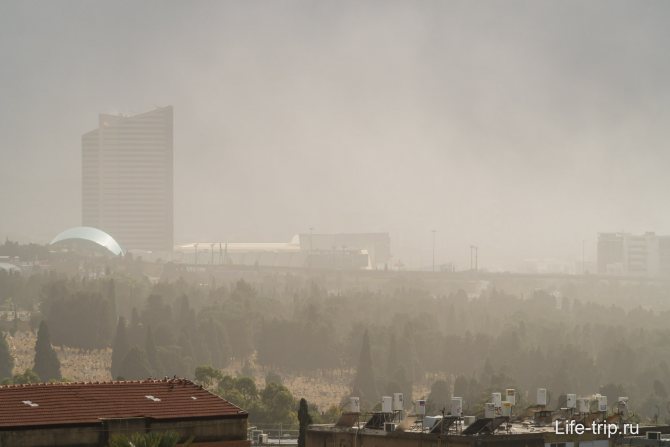
Khamsin - everything is like smog
Divorce in Israel
Getting a divorce in Israel is a bad idea. If there is a possibility that the family will break up, it is better to weigh the pros and cons before repatriating. Israel is somehow on its own and not very friendly with international law. I speak from my own bitter experience. Women have more rights in Israel than in Russia. It’s not for nothing that there is an organization that at least somehow tries to help men.
If both spouses are Jews, then during a divorce the ex-husband will have to pay not only alimony for the child, but also for his wife. Moreover, in such an amount that her standard of living does not change. And even if she marries again, it doesn’t change anything, as far as I understand. At the same time, no one cares about the size of the salary; they will be sent to prison for non-payment and driven into specific debts for the rest of their lives. Because of the fear of such bondage, few Jewish men decide to divorce; it is much easier to cheat on the side. So much for strong Israeli families.
If there is only one Jew, then the marriage is not religious and everything is simpler. There will be child support only. But nevertheless, the ex-husband will be able to prove something and get the opportunity to see the child only through the court and a paid lawyer, who costs unrealistic money. One of my friends paid $10,000 for this.
Medicine
Tourists get quite good medicine for a lot of money. But the residents... Everything here is very ambiguous, but at least not as rosy as they say. Yes, I know someone who was saved from cancer, who had spinal surgery and the person can walk. But how can we understand what would happen to these people in Russia or Germany? After all, in Israel people also die from cancer; not everyone is saved. It’s hard for me to say; this requires some kind of official statistics.
They say that in Israel they will first lead you to death, and then save you. This means that until you die, no one will care about you. And indeed it is. Again, from personal experience, it is useless to go with allergies, chronic runny nose, or some kind of incomprehensible pain. They will give you some pills or drops and say, well, they’re fine, you’re not dying, so go in peace.
And queues. Waiting in line to see a doctor for several months or six months is the norm. Of course, not to an ordinary therapist, but to a specialist. But damn, six months, how?! You can go for the money, yes. How can you pay 1,500 shekels (RUB 35,282) for the appointment? I waited and didn't pay. Likewise, there are queues in the hospital (the emergency department of a hospital), where people actually sometimes start scandals in order to get through to a doctor.
Hospitals look different inside. Sometimes it is somewhat reminiscent of an old Soviet hospital, where there is no smell of European-quality renovation, and sometimes it is more or less modern. But in general we can say that there is no luxury if you suddenly need it.

Hospitals look different inside
PS Just in case, let me remind you of my position: there are no ideal countries, absolutely everywhere there are pros and cons, and you need to look for your personal balance of pros and cons. Israel didn’t suit me; apparently the conditions in Moscow were too good.
Work permit
To legally work in Israel, you will need two documents: a permit and a B-1 work visa. The best option: find suitable vacancies yourself, come to the country as a tourist, undergo interviews, wait for the employer’s decision, discuss the details of the work on the spot and sign a contract with the company that accepted you.
The employer is responsible for obtaining the permit by submitting a package of documents to the Ministry of Internal Affairs. Moreover, the permit is strictly tied to a specific company. If you transfer to another company before its expiration date, you will have to receive the paper again, arriving at the Ministry together with the new employer.
Not all Israeli companies have the right to hire foreigners - this requires a special license issued by the Ministry of Industry, Labor and Trade.
Security and bureaucracy
But here it’s just the opposite, I was pleasantly surprised. Despite regular reports of terrorist attacks, you feel safer in Israel than in Moscow. Here you don’t have to be afraid of a group of teenagers walking towards you on a dark street, here you can call the police, report any threat and the police will come, and not say something like “they’ll kill you, then call” - there is the rule of law.
And in Israel there is such a thing that I really love and which is not in Russia: I call it “predictable bureaucracy.” To obtain the necessary certificate, document, and so on, you need to follow a predetermined procedure, and everything will be ready on time without the phrase “well, you know, there’s a lot of work right now, but you can help resolve the issue quickly.”
For example, obtaining a foreign passport in Israel looks like this: you come to the Ministry of Internal Affairs, put one signature on an application that is printed out for you, take a photo on the spot, pay the state fee (cards are accepted for payment) and that’s it. In two weeks - and in fact even faster - the postman will deliver your passport to your home. No forms on three pages, no certificates from the military registration and enlistment office and copies of the work book.
Visa to work in Israel
After receiving permission, you must apply for a B-1 work visa. To do this, the employer submits a package of documents to the Ministry of Internal Affairs, and the future employee – to the Israeli Consulate. The visa is valid for 30 days. After arriving in the country and applying to the Ministry of Internal Affairs, the visa is extended for one year with the possibility of subsequently increasing the period of validity to five years.
Documents you need to submit to the consulate in your country:
- Visa application form and Form 1 confirming consent to fingerprinting.
- Two photographs that meet the standards.
- Valid passport.
- Birth, marriage/divorce certificate.
- Certificate confirming no criminal record.
- Medical report, including fluorography and confirmation of the absence of sexually transmitted diseases.
- An employment contract signed by both parties.
The visa indicates the field of activity and the company. Therefore, if you decide to change jobs, you will have to do everything all over again with a new employer.
Employment for repatriates
Jews are very willing to find jobs for people of their nationality. Even if a person currently lives in another country, but intends to move to Israel. A help center was created especially for these purposes, in which the list of in-demand specialists is updated daily.
The country especially needs medical personnel, because if you have a medical education and Jewish roots, the main task for you is to confirm your qualifications, then finding a job will not be so difficult.
The Jewish Agency for Immigrants, Sokhnut, also helps new arrivals find work free of charge. All services are paid for by the employer. The website has a list of courses that allow you to get a new profession.
Medicine
Israeli medicine is the biggest disappointment. Agree, when we hear the phrase “Israeli medicine,” we imagine how a patient at the fourth stage of cancer is returned from the other world and runs a charity marathon. In reality, everything is different.
In Israel, there are several insurance companies to which every citizen is tied, and these companies apparently set doctors the task of reducing the cost of treatment. The doctors are probably entitled to something for this. As a result, making a diagnosis “by eye” is a common practice.
Let me give you an example: one friend went to the hospital complaining of abdominal pain and high fever. The doctor examined (literally) the patient, and without doing an ultrasound or a basic blood test, he sent her home, saying that this was ordinary poisoning and here is activated charcoal.
Three days later, the girl was hospitalized with a ruptured appendix and purulent peritonitis. In other words, it seems that the doctor is resisting with all his might to refer you to some procedures, studies, and so on. Fewer procedures means lower cost of treatment.
It is also necessary to make an appointment with all doctors and for most procedures. On the one hand, it sounds good, on the other hand, the recording can be carried out several months in advance. Let's say, making an appointment with an ophthalmologist in May for an appointment in July is a common thing.
Yes, if a person is near death, then Israeli medicine sometimes works miracles, the problem is that it can bring a person to such a state itself.
Popular specialties
According to data on the Israeli government portal, the country most needs the following specialists:
- doctors of all categories;
- experienced engineers, builders;
- IT specialists;
- cooks, bakers, chefs (national cuisine);
- nannies, nurses;
- service workers (waiters, housekeepers, maids, salespeople, loaders);
- workers of industrial enterprises (line operators, packers);
- agricultural workers (harvest workers).
There are also constantly open vacancies in finance, marketing, and sales. But it’s worth considering that to be employed in highly qualified professions, knowledge of Hebrew is required! Gaps in the language will significantly narrow the range of opportunities, and with them the potential income.
Salaries in Israel
In May 2021, the average salary in Israel was $3,320. The highest salaries were in the IT sector: more than $7,000 on average. The minimum monthly salary in 2021 is set at $1,500 per month.
At the same time, foreign citizens officially working in the country have the same rights regarding working conditions, benefits, salaries, and benefits as local residents.
Income varies greatly by age and education. For minors it is set as a percentage of the full rate. Therefore, the minimum wage for teenagers under 16 years old is $5.1 per hour, for those aged 16-17 years old - $5.5, for young people 17-18 years old - $6.1. For an adult, the minimum wage is $8.4 per hour.
Service
The level of service in Israel can be characterized by one phrase: “From dawn to dusk, brother ******** [deceives] brother.” You can easily be deceived, cheated, or sell any product at exorbitant prices. In small stores, where the owner and seller are the same person, there are no price tags. The owner has the price in his head, and it is announced after he visually assesses your solvency, and the final price depends on your bargaining ability.
Once we bought a mattress, the original cost of which was 2200 shekels (37 thousand rubles), and in the end we bought it for 1300 shekels (22 thousand rubles). And this is not in the market, but in a regular store.
If you take the risk of buying something second-hand, there is a huge chance that it is either a fake or will break the next day.
In Moscow, we are used to the fact that if you are rude in a cafe and you write a review on Facebook, there is a chance that the management of the cafe will apologize and invite you to a free dinner. If you do this in Israel, there is a chance that you will get rude on Facebook again (the most striking example, yet another one).












